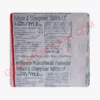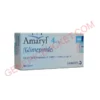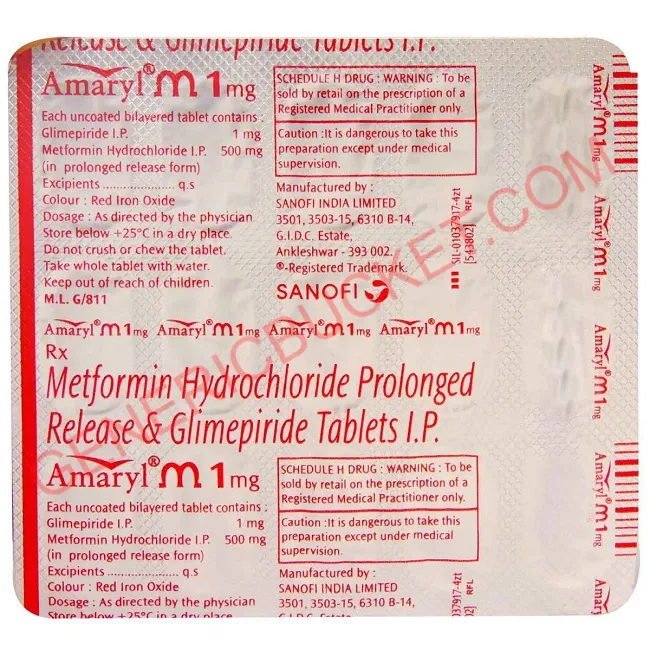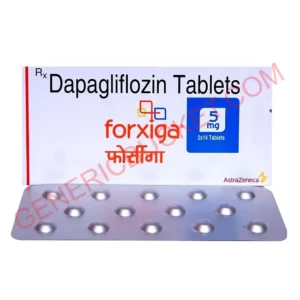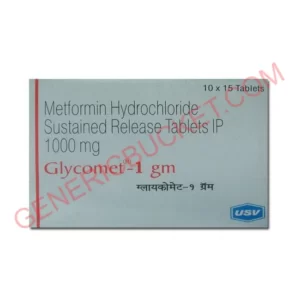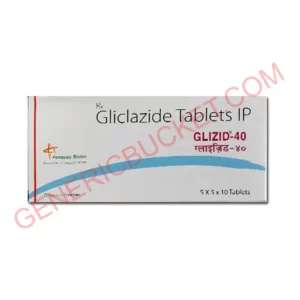Amaryl M 1mg Tablet (Glimepiride 1mg / Metformin 500mg)
$42.00 – $112.00Price range: $42.00 through $112.00
| Country of Origin | India |
|---|---|
| Dosage Form | Tablets |
| Equivalent Brand | Glycomet GP |
| Generic Name | Metformin / Glimepiride |
| Indication | Type 2 diabetes |
| Manufacturer | Sanofi India Ltd |
| Packaging | 15 tablets in 1 strip |
| Composition | Metformin (500mg) + Glimepiride (1mg) |
| Pack Size | 45 tablet/s, 90 tablet/s, 135 tablet/s |
| Amaryl M 1mg Tablet (Glimepiride 1mg / Metformin 500mg) | |||
| Pack Size | Price | Price/Unit | Add To Cart |
| 45 Tablet/s | $42.00 (0.93/unit) | $0.93 | |
| 90 Tablet/s | $68.00 (0.76/unit) | $0.76 | |
| 135 Tablet/s | $112.00 (0.83/unit) | $0.83 | |
INTRODUCTION
AMARYL is a combination of Glimepiride and Metformin which belongs to a group of medicines called Antidiabetic agents. AMARYL is used to treat type 2 diabetes mellitus when diet, exercise and the single agent does not result in adequate glycemic control. Type 2 diabetes is a chronic medical condition in which the body does not make enough insulin, or the produced insulin does not work well. Symptoms include excessive urination, excessive thirst, hunger, fatigue, and blurred vision.
Glimepiride lowers blood sugar by causing the pancreas to produce more insulin and helps the body use insulin efficiently. Metformin is a biguanide which effectively reduces the total amount of sugar released into the blood by the liver. Along treatment with AMARYL follow regular exercise and diet plan as advised by your doctor to achieve better results.
Before taking AMARYL inform your doctor if you have type 1 diabetes mellitus, diabetic ketoacidosis, severe liver or kidney disease, acute heart problems. Inform your doctor if you are pregnant or breastfeeding. It is not suitable for use in children and adolescents under 18 years of age. Avoid consumption of alcohol during treatment with AMARYL as it may increase or decrease the blood sugar lowering action of AMARYL and increases the risk of lactic acidosis. The most common side effects of taking AMARYL are taste disturbance, nausea, diarrhea, stomachache, and vomiting. Contact your doctor if any of the symptoms worsen.
USES OF AMARYL
- Treats type 2 diabetes mellitus (when diet, exercise and the single agent does not result in adequate glycemic control)
HOW AMARYL WORKS
AMARYL controls blood glucose levels, where glimepiride works by increasing the amount of insulin released by the pancreas in order to lower the blood glucose. Metformin works by lowering glucose production in the liver, delaying glucose absorption from intestine, and increasing the body’s sensitivity to insulin.
DIRECTIONS FOR USE
Take AMARYL as advised by your physician. Swallow AMARYL with a glass of water. Do not crush or chew the medicine. Your doctor will decide the correct dose and duration for you depending upon your age, body weight and disease condition. Do not stop taking AMARYL without informing your doctor.
SIDE EFFECTS OF AMARYL
COMMON
- Taste disturbance
- Nausea
- Diarrhea
- Vomiting
- Stomach pain
- Loss of appetite
RARE
- Low blood sugar levels (hypoglycemia)
- Signs of reduced number of red blood cells (skin pale and weakness or breathlessness), platelets (easy bleeding or bruising) or white blood cells (repeated infections)
- Decreased vitamin b12 levels
- Skin rashes, redness, itching and hives
Stop taking AMARYL and contact your doctor immediately if you experience any of the following side effects:
- Lactic acidosis
- Inflammation of the liver which may result in jaundice (yellowing of skin or eyes)
- Severe allergic reactions (such as skin rash, hives, and increased sensitivity to sun, inflammation of blood vessels which may develop into serious reactions with difficulty in breathing, fall in blood pressure and sometimes progressing to shock)
- Severe low blood sugar levels including loss of consciousness, seizures, or coma
HOW TO MANAGE SIDE EFFECTS
Diarrhoea:
Drink lots of fluids, such as water or fruit juices to keep yourself hydrated. Avoid taking any medicine on your own for treating diarrhea. Consult your doctor if the symptom did not improve.
Stomach pain:
Rest and relax. Eat and drink slowly or try to have smaller and frequent meals. Keep a heat pad on your stomach. Consult your doctor if the symptom did not improve.
Loss of appetite:
Eat when you feel hungry. Eat smaller meals frequently than usual. Snack only when you’re hungry. Consult your doctor if the symptom did not improve.
Nausea and vomiting:
Stick to simple meals. Avoid eating oily, fried, and spicy foods. Do not perform any strenuous activities immediately after eating. Consult your doctor if the symptom did not improve.
WARNING & PRECAUTIONS
PREGNANCY
AMARYL should not be taken during pregnancy. Consult your doctor before taking AMARYL if you are planning to become pregnant.
BREASTFEEDING
AMARYL should not be taken during breastfeeding as it may pass through breast milk. Consult your doctor before taking AMARYL for advice.
DRIVING AND USING MACHINES
Do not drive or handle any machines if you experience low or high blood sugar levels (symptoms include dizziness, tiredness, shaking or trembling) or if you develop visual problems due to altered blood sugar levels.
ALCOHOL
Avoid consumption of alcohol during treatment with AMARYL as it may increase or decrease the blood sugar lowering action of AMARYL and increases the risk of lactic acidosis. Consult your doctor for advice before taking AMARYL.
KIDNEY
AMARYL is not recommended for use in patients with severe kidney disease and it should be used with caution in patients with kidney disease and your dose will be adjusted if needed depending upon kidney function. Consult your doctor before taking AMARYL.
LIVER
AMARYL is not recommended if you have severe liver disease and it should be used with caution in patients with liver disease and your dose will be adjusted if needed depending upon liver function. Consult your doctor before taking AMARYL.
ALLERGY
Do not take AMARYL if you are allergic (hypersensitive) to Glimepiride or Metformin or other sulfonylureas (such as glipizide, glibenclamide) or sulfonamides (such as sulfamethoxazole).
HEART DISEASE
AMARYL is not recommended for use in patients with acute heart problems or recently had a heart attack or have severe circulatory problems or breathing difficulties (signs of heart failure). Consult your doctor before taking AMARYL.
OTHERS
AMARYL is not recommended for use, if you have:
- Type 1 diabetes mellitus
- Diabetic ketoacidosis
- Diabetic coma
- Uncontrolled diabetes with nausea, vomiting, rapid weight loss, diarrhea, lactic acidosis (lactic acid build up in the bloodstream) or ketoacidosis (ketone bodies accumulate in the blood)
- Dehydration
- Severe infection (such as infection affecting lungs or kidneys)
Before taking AMARYL inform your doctor if you:
- Are recovering from injury, operation, infections with fever, or from other forms of stress
- Have glucose-6-phosphate dehydrogenase (G6PD) deficiency
- Have various factors which could increase the risk of low blood sugar levels (such as undernourishment, irregular mealtime, missed or delayed meal or period of fasting, change in diet, hormone-induced disorders)
Use in pediatrics:
AMARYL is generally not recommended for use in children and adolescents (under 18 years of age). Consult child’s doctor for advice.
Use in geriatrics:
AMARYL is not recommended for use in elderly patients (aged 75 years or above) and it should be used with caution in elderly patients (aged 65 years or above), especially in patients with impaired kidney function. Your doctor may assess your kidney function more frequently during treatment with AMARYL. Consult your doctor before taking AMARYL.
INTERACTIONS
A. Drug-Drug interactions:
Before taking AMARYL inform to your doctor, if you are taking any of these medicines:
- Other sulphonylureas such as glibenclamide, insulin (used to lower blood sugar levels)
- Anabolics (supports muscle build up)
- Warfarin (treats blood clot)
- Fenfluramine (used to reduce weight)
- Phenylbutazone, azopropazone, oxyphenbutazone (treats pain and inflammation)
- Disopyramide (treats heart problems)
- Fibrates such as fenofibrate, nicotinic acid, colesevelam (lowers high cholesterol level)
- Angiotensin-converting enzyme (ACE) inhibitors such as captopril, lisinopril, diuretics such as furosemide, chlorthalidone, hydrochlorothiazide or diazoxide (treats blood pressure)
- Fluoxetine, monoamine oxidase inhibitors such as isocarboxazid, selegiline and chlorpromazine (used to treat mental disorders)
- Allopurinol, probenecid, sulfinpyrazone (treats gout)
- Cyclophosphamide, ifosfamide, trofosfamide (treats cancer)
- Tetracyclines (Ex. minocycline, doxycycline), chloramphenicol, fluconazole, miconazole, quinolones (Ex. moxifloxacin, ciprofloxacin), clarithromycin, rifampicin (treats bacterial and fungal infections)
- Tritoqualine, glucocorticoids (Ex. beclomethasone, hydrocortisone) (treats nasal allergies)
- Pentoxifylline in high doses of intravenous infusion (used to improve blood flow)
- Sulfonamides such as sulfamethoxazole (treats urinary infections)
- Medicines used for male sex hormone replacement therapy (Ex. testosterone) and medicines containing female sex hormones (Ex. oestrogens, progestogens)
- Sympatholytics such as clonidine, methyldopa (treats high blood pressure, heart failure, or prostate symptoms)
- Levothyroxine (used to stimulate thyroid gland)
- Adrenaline and sympathomimetics such as phenylephrine, norepinephrine (treats life-threatening cardiac arrest and low blood pressure)
- Laxatives such as bisacodyl (treats constipation)
- Phenytoin (treats fits)
- Glucagon (used to treat severely low blood sugar)
- Barbiturates such as pentobarbital, amobarbital (treats nervousness and sleep problems)
- Acetazolamide (treats increased pressure in the eye)
Overdosage:
If you or anyone else take too much of AMARYL, contact your doctor immediately or go to a nearest hospital straight away. Overdosage symptoms of AMARYL includes risk of low blood sugar levels (in severe cases it may lead to loss of consciousness and coma) and it may cause life-threatening lactic acidosis. Symptoms of lactic acidosis include vomiting, bellyache with muscle cramps, general feeling of not being well with severe tiredness, reduced body temperature, low heartbeat, and difficulty in breathing.
Related Product
Related products
Diabetes
Diabetes
Diabetes
Diabetes
Diabetes

